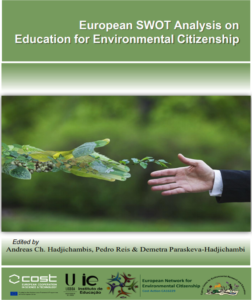Chapter 4: Education for Environmental Citizenship: An opportunity for Flanders BELGIUM? Results of the Flemish SWOT analysis for ENEC
Jelle Boeve-de Pauw
Abstract: This chapter reports on the results of a SWOT analysis concerning the concept of Education for Environmental Citizenship for Flanders (the Dutch speaking community of Belgium). The analysis is part of the work plan of the COST action ‘European Network for Environmental Citizenship’. The methodology of the Flemish SWOT is in line with the overall ENEC methodology. Six participants answered the questionnaire: academics, teachers and professionals affiliated to governmental and non-governmental decision-making. In general, it can be stated that the Flemish participants’ responses reflect a shared interpretation of the strengths, weaknesses, opportunities and threats for the concept of Education for Environmental Citizenship in Flanders. The main strengths that are identified are the holistic nature of Education for Environmental Citizenship, its clear focus on environmental issues, its explicit inclusion of the political, and its propagated co-creative and participatory approach. Weaknesses that are touched upon concern a general public and institutional unfamiliarity with the concept of Education for Environmental Citizen-ship and the risk of conceptual confusion. Also the unclear goals of Education for Environmental Citizenship are identified as a weakness, together with a potential deprioritisation of social and economic perspectives in sustainability issues. The respondents see potential opportunities in seeking inspiration for Education for Environmental Citizenship in non-formal educational contexts. Given the recent adoption of new curricular goals for Flemish formal education there is also an opportunity to connect or infuse the concept of Education for Environmental Citizenship at this level. The respondents furthermore identified a general societal sense of urgency regarding environmental and citizenship issues, as well as the concept’s transferability to the employability debate as opportunities for Flanders. Threats are connected to the (yet) unclear goals of Education for Environmental Citizenship, a low perceived connection to the curriculum and the perception that Flemish education has been subjected to (too) many innovations. These strengths, weaknesses, opportunities and threats need to be capitulated on when designing an implementation strategy that aims to successfully infuse Education for Environmental Citizenship into education in Flanders.

